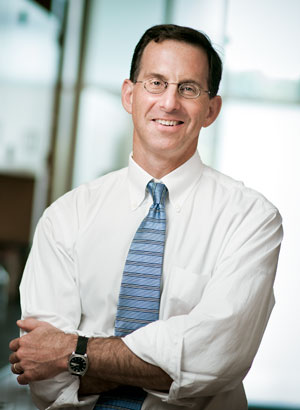UNC and GSK announce novel partnership to accelerate search for HIV cure
May 12, 2015
The University of North Carolina at Chapel Hill, a leading global public research university with significant expertise in HIV basic and clinical research, and GSK, a global, research-based pharmaceutical and health-care company with a legacy of success in developing treatments for HIV, announced on May 11 the establishment of a dedicated HIV Cure Center and a jointly owned new company that will focus on discovering a cure for HIV/AIDS.
The unique public-private partnership will redefine traditional ways of conducting research and develop a new model to seek breakthroughs necessary to tackle an extraordinarily challenging global health issue.
David Margolis, MD, professor of epidemiology at the UNC Gillings School of Global Public Health and renowned HIV/AIDS researcher, will serve as scientific director of the HIV Cure center. Margolis, a member of the UNC faculty since 2005, also holds professorships in the UNC School of Medicine, in internal medicine and in microbiology and immunology. He is leader of the Collaboratory of AIDS researchers for Eradication, a new vision for HIV/AIDS research that aims to pursue a comprehensive collaborative search for approaches to eradicate HIV.
The HIV Cure Center will be located on the UNC-Chapel Hill campus and will focus exclusively on finding a cure for HIV/AIDS. The new company, Qura Therapeutics, will manage the business side of the partnership, including intellectual property, commercialization, manufacturing and governance.
Together, the HIV Cure Center and Qura Therapeutics will serve as a catalyst for additional partners and public funding that likely will be needed to eradicate HIV worldwide. The collaboration also is expected to recruit and attract top talent from around the world.
“The excitement of this public-private partnership lies in its vast potential,” said UNC-Chapel Hill Chancellor Carol L. Folt. “Carolina has been at the forefront of HIV/AIDS research for the last 30 years. This first of its kind, joint-ownership model is a novel approach toward finding a cure, and we hope it serves as an invitation to the world’s best researchers and scientists. Today, Carolina’s best are taking another major step in the global fight against HIV/AIDS.”
UNC-Chapel Hill and GSK will focus on the latest scientific approaches to curing HIV, including a leading research approach toward an HIV cure, sometimes called “shock and kill.” This approach seeks to reveal the hidden virus that persists in people with HIV infection despite successful drug therapy and to augment the patient’s immune system to clear these last traces of the virus and infected cells.
Part of this new paradigm was first tested at UNC-Chapel Hill. In 2012, a team led by Margolis and other UNC-Chapel Hill researchers demonstrated that latent HIV might be unmasked by new therapies. Recently, UNC researchers received Food and Drug Administration approval for a study in HIV-positive volunteers to combine this technique and an immune-boosting strategy.
“After 30 years of developing treatments that successfully manage HIV/AIDS without finding a cure, we need both new research approaches to this difficult medical problem and durable alliances of many partners to sustain the effort that will be needed to reach this goal,” Margolis said. “The ‘shock and kill’ approach has shown significant promise in early translational research on humans and has been the focus of research for the last several years.”
“Although today’s treatments for HIV mean that millions of lives have been saved, people still have to take a lifetime of treatments, which takes an emotional toll and places an economic burden on society that is particularly challenging in countries with limited resources,” said Zhi Hong, senior vice president and head of the Infectious Diseases Therapy Area Unit at GSK. “This is why we must dedicate the next 30 years to finding a cure and scaling it up so that one day we will end the HIV/AIDS epidemic.”
Through the new company, GSK will invest $4 million per year for five years to fund the initial HIV Cure Center research plan, and a small research team from GSK will move to Chapel Hill to be co-located with UNC researchers. The University will provide world-class laboratory space on its medical campus for the HIV Cure center and the new company. GSK will be contributing its expertise in medicines discovery, development and manufacturing, and UNC-Chapel Hill will bring to the table its research and translational medicine capabilities, talent, and access to patients and funding.
GSK and the University entered into a five-year partnership, but project leaders anticipate several extensions as the teams work to find a cure. The organization predicts it will take at least 15 to 20 years to produce an applicable HIV cure.
“The mountain is pretty steep,” Margolis said. “It’s time to get to work.”

